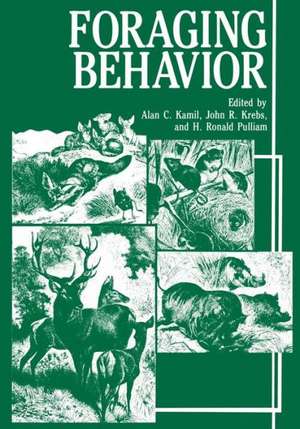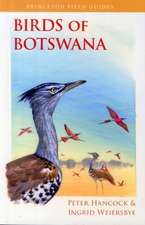Foraging Behavior
Editat de A.C. Kamil, J.R. Krebs, H.R. Pulliamen Limba Engleză Paperback – noi 2011
Preț: 667.71 lei
Preț vechi: 785.54 lei
-15% Nou
Puncte Express: 1002
Preț estimativ în valută:
127.77€ • 139.22$ • 107.66£
127.77€ • 139.22$ • 107.66£
Carte tipărită la comandă
Livrare economică 23 aprilie-07 mai
Preluare comenzi: 021 569.72.76
Specificații
ISBN-13: 9781461290278
ISBN-10: 1461290279
Pagini: 688
Ilustrații: 676 p.
Dimensiuni: 178 x 254 x 36 mm
Greutate: 1.18 kg
Ediția:Softcover reprint of the original 1st ed. 1987
Editura: Springer Us
Colecția Springer
Locul publicării:New York, NY, United States
ISBN-10: 1461290279
Pagini: 688
Ilustrații: 676 p.
Dimensiuni: 178 x 254 x 36 mm
Greutate: 1.18 kg
Ediția:Softcover reprint of the original 1st ed. 1987
Editura: Springer Us
Colecția Springer
Locul publicării:New York, NY, United States
Public țintă
ResearchCuprins
Optimal Foraging Theory.- A Brief History of Optimal Foraging Ecology.- Faith and Foraging: A Critique of the “Paradigm Argument from Design”.- The Problem of Selectivity.- A Test of the Energy Maximization Premise of Optimal Foraging Theory.- Delivering Food to a Central Place: Three Studies of Bee-Eaters MeropsApiaster.- Operant Conditioning Simulations of Foraging and the Delay-Reduction Hypothesis.- Foraging Behavior of Some Wintering Waders: Prey-Selection and Habitat Distribution.- Foraging Time Constraints and Diet Choice.- Patch Utilization.- Stochastic Models of Optimal Foraging.- Starlings and Optimal Foraging Theory: Modelling in a Fractal World.- Tests of Optimal Foraging Using an Operant Analogue.- Competition for Non-Depleting Resources: The Ideal Free Distribution in Sticklebacks.- Foraging Games in a Random Environment.- The Reproductive Consequences of Foraging.- Reproductive Consequences of Dietary Specialization and Switching in an Ecological Generalist.- The Consequences of Foraging for Reproductive Success.- Parents, Nestlings and Feedings Frequency: A Model of Optimal Parental Investment and Implications for Avian Reproductive Strategies.- Learning and Foraging.- The Role of Learning in Honey Bee Foraging.- Adaption to Reward.- Signal Detection Theory and Foraging for Cryptic or Mimetic Prey.- Foraging Theory and Design.- Should Foragers Remember Where They’ve Been? Explorations of a Simulation Model Based on the Behavior and Energetics of Territorial Hummingbirds.- Randon and Systematic Foraging, Experimental Studies of Depletion and Schedules of Reinforcement.- Caching Behavior.- Cache-Protecting Behavior of Food-Hoarding Animals.- Cache Site Memory in Birds.






